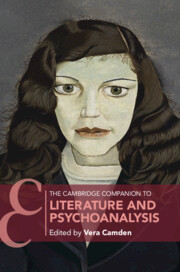Book contents
- The Cambridge Companion to Literature and Psychoanalysis
- The Cambridge Companion to Literature and Psychoanalysis
- Copyright page
- Contents
- Figures
- Abbreviations
- Contributors
- Acknowledgments
- Chronology
- Introduction Reading to Recover
- Part I In History
- 1 Varieties of Psychoanalytic Experience
- 2 Recognitions
- 3 Rivalry and the Favorite Child in Jane Austen’s Pride and Prejudice and Persuasion
- 4 Encountering Invisible Presence
- 5 Dislocating the Reader
- Part II In Society
- Part III In Sight
- Part IV In Theory
- Further Reading
- Index
3 - Rivalry and the Favorite Child in Jane Austen’s Pride and Prejudice and Persuasion
from Part I - In History
Published online by Cambridge University Press: 16 December 2021
- The Cambridge Companion to Literature and Psychoanalysis
- The Cambridge Companion to Literature and Psychoanalysis
- Copyright page
- Contents
- Figures
- Abbreviations
- Contributors
- Acknowledgments
- Chronology
- Introduction Reading to Recover
- Part I In History
- 1 Varieties of Psychoanalytic Experience
- 2 Recognitions
- 3 Rivalry and the Favorite Child in Jane Austen’s Pride and Prejudice and Persuasion
- 4 Encountering Invisible Presence
- 5 Dislocating the Reader
- Part II In Society
- Part III In Sight
- Part IV In Theory
- Further Reading
- Index
Summary
In Austen’s Pride and Prejudice and Persuasion, Elizabeth Bennet and Elizabeth Elliot, the preferred daughters of their fathers, are prey to blind spots in their judgments. Austen differentiates Elizabeth Elliot’s static character, certain of her “rights” to preference and pride of place in her father’s life, from Elizabeth Bennet’s character despite her prejudice as the favorite child of her father, in relishing quick judgments of others. Elizabeth realizes in time that she has been misled by her vanity in judging both Darcy and Wickham: “she had been blind, partial, prejudiced, absurd.” Elizabeth Elliot, favorite of her father and his consort, her mother having died when she was 16, suffers a harsher fate, in her oedipal victory. She remains an adolescent with self-centered misperceptions. Trapped in her narcissistic defenses, she misjudges the flattering Mr. Elliot and Mrs. Clay, suffers humiliation at their deceptions, but remains unchanged and alone with her father.
- Type
- Chapter
- Information
- The Cambridge Companion to Literature and Psychoanalysis , pp. 54 - 72Publisher: Cambridge University PressPrint publication year: 2021

